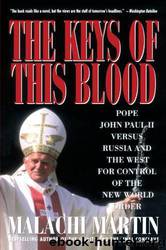Keys of This Blood: Pope John Paul II Versus Russia and the West for Control of the New World Order by Malachi Martin

Author:Malachi Martin
Language: eng
Format: mobi
ISBN: 9780671747237
Publisher: Simon & Schuster
Published: 1991-09-15T05:00:00+00:00
19. Forces of the "New Order": The Two Models of a Geopolitical House
In the shifting ground of human affairs today, the most surprising new contours are provided by two leaders, John Paul II and Mikhail Gorbachev. Gorbachev appears as the active agent of changes to which the West is reacting, while John Paul II gives all the impression of one who, not in mere reaction, is riding herd over these active and reactive participants. Why these two leaders should be able to exercise these key functions is a source of puzzlement to those who are not aware of the two men's importance; and to those who sometimes fail to appraise correctly and appreciate the reason for their prominence.
These two men are the only two among world leaders who not only head geopolitical institutions but have geopolitical aims. Geopolitics is their business. Now, the precise nature of the shift in world affairs is geopolitical. Alone among leaders, these two men have firsthand acquaintance with the geopolitical. But for the vast majority of onlookers and for many in government, geopolitics is merely a way of speaking about the mutual relationship of different systems of politics. Thus, the gargantuan change being effected in the shifting ground escapes them.
The term "geopolitics" is a relatively recent invention. It is composed of two Greek words, meaning "earth" and "political system," which the ancient Greeks never combined.
Those Greeks were very aware of the relations between different states and nations, each with its own political system, each being what the Greeks called a politeia. They saw all of these as constituting a loosely connected arrangement of differing political entities. Whether the relationships between them were based on peaceful trading or on signed alliances and associations, or on subjugation and imperial domination, the Greeks' fundamental notion of internationalism was that it involved different politically structured systems. One state, one politeia, might dominate several others. Several states might group together in offensive and defensive alliances or in straight commercial and industrial partnership. But there never was a moment when the same political structure was accepted and established in what originally were politically different states. Nobody ever proposed that the same politeia be shared freely by the different states and nations.
This was the limited extent of their internationalism. Late in their history, some few individuals lauded and tried to practice the ideal of the cosmopolitis, the citizen of the world, the individual who felt "at home" in any and every one of the political systems of the day. But this was seen as an individual whimsy, a romantic and somewhat exotic experience, not as a desirable condition of mankind in general, and certainly not as embodying a political ideal to be striven for. They never even conceived of a cosmopoliteia. They never conjoined a word for "earth" or "world" with the word for "political system."
Until the end of the nineteenth century and the beginning of the twentieth, this internationalism provided the only framework within which relationships between different nations and states were considered.
Download
This site does not store any files on its server. We only index and link to content provided by other sites. Please contact the content providers to delete copyright contents if any and email us, we'll remove relevant links or contents immediately.
Resisting Happiness by Matthew Kelly(3337)
The Social Psychology of Inequality by Unknown(3022)
Day by Elie Wiesel(2781)
Designing Your Life by Bill Burnett(2742)
The Giving Tree by Shel Silverstein(2337)
Human Design by Chetan Parkyn(2068)
Angels of God: The Bible, the Church and the Heavenly Hosts by Mike Aquilina(1965)
The Supreme Gift by Paulo Coelho(1963)
Jesus of Nazareth by Joseph Ratzinger(1811)
Hostage to the Devil by Malachi Martin(1802)
Augustine: Conversions to Confessions by Robin Lane Fox(1770)
7 Secrets of Divine Mercy by Vinny Flynn(1742)
Dark Mysteries of the Vatican by H. Paul Jeffers(1718)
The Vatican Pimpernel by Brian Fleming(1700)
St. Thomas Aquinas by G. K. Chesterton(1634)
Saints & Angels by Doreen Virtue(1604)
The Ratline by Philippe Sands(1573)
My Daily Catholic Bible, NABRE by Thigpen Edited by Dr. Paul(1500)
Called to Life by Jacques Philippe(1479)
